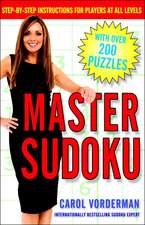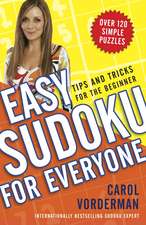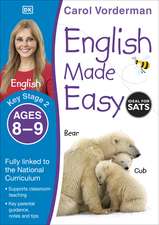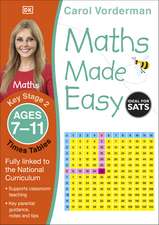Science Made Easy, Ages 9-10 (Key Stage 2): Supports the National Curriculum, Science Exercise Book: Made Easy Workbooks
Autor Carol Vordermanen Limba Engleză Paperback – 30 iun 2014 – vârsta până la 10 ani
Carol Vorderman can help your child succeed in science with this homeschool learning resource for 9-10 year olds. Science Made Easy is one of Carol Vorderman's series of DK workbooks packed with notes and tips to make home learning about science easy and fun! Follow the exercises and activities with your child at home to strengthen their learning in school. Each title contains a progress chart so your child can keep track of all the exercises they have completed and colour in the topic stars as they go. Helpful parents' notes explain what children need to know at each stage and what's being covered in the curriculum so you can support and homeschool your child with confidence.
This book will help your child learn about science topics such as planets, forces, and soluble materials. Developed in consultation with leading educational experts to support curriculum learning, Science Made Easy is a great way to improve your child's science skills - "the more you practise, the better you'll be!" (Carol Vorderman)
Din seria Made Easy Workbooks
- 13%
 Preț: 22.73 lei
Preț: 22.73 lei - 30%
 Preț: 22.69 lei
Preț: 22.69 lei - 30%
 Preț: 22.70 lei
Preț: 22.70 lei - 13%
 Preț: 22.76 lei
Preț: 22.76 lei - 13%
 Preț: 22.67 lei
Preț: 22.67 lei - 13%
 Preț: 22.70 lei
Preț: 22.70 lei - 30%
 Preț: 22.69 lei
Preț: 22.69 lei - 13%
 Preț: 22.63 lei
Preț: 22.63 lei -
 Preț: 32.31 lei
Preț: 32.31 lei - 30%
 Preț: 22.69 lei
Preț: 22.69 lei -
 Preț: 26.20 lei
Preț: 26.20 lei - 13%
 Preț: 22.67 lei
Preț: 22.67 lei - 13%
 Preț: 22.79 lei
Preț: 22.79 lei - 30%
 Preț: 22.67 lei
Preț: 22.67 lei - 30%
 Preț: 22.67 lei
Preț: 22.67 lei - 13%
 Preț: 22.70 lei
Preț: 22.70 lei - 30%
 Preț: 22.67 lei
Preț: 22.67 lei - 13%
 Preț: 22.69 lei
Preț: 22.69 lei - 13%
 Preț: 22.70 lei
Preț: 22.70 lei - 30%
 Preț: 22.69 lei
Preț: 22.69 lei -
 Preț: 26.20 lei
Preț: 26.20 lei - 30%
 Preț: 22.66 lei
Preț: 22.66 lei - 30%
 Preț: 22.67 lei
Preț: 22.67 lei -
 Preț: 26.19 lei
Preț: 26.19 lei - 30%
 Preț: 22.66 lei
Preț: 22.66 lei - 14%
 Preț: 27.64 lei
Preț: 27.64 lei - 14%
 Preț: 27.64 lei
Preț: 27.64 lei - 30%
 Preț: 22.67 lei
Preț: 22.67 lei - 13%
 Preț: 22.73 lei
Preț: 22.73 lei - 15%
 Preț: 27.59 lei
Preț: 27.59 lei - 13%
 Preț: 22.66 lei
Preț: 22.66 lei - 30%
 Preț: 22.69 lei
Preț: 22.69 lei - 30%
 Preț: 22.69 lei
Preț: 22.69 lei -
 Preț: 26.22 lei
Preț: 26.22 lei - 30%
 Preț: 22.67 lei
Preț: 22.67 lei - 15%
 Preț: 27.59 lei
Preț: 27.59 lei - 13%
 Preț: 22.66 lei
Preț: 22.66 lei - 30%
 Preț: 22.69 lei
Preț: 22.69 lei -
 Preț: 32.31 lei
Preț: 32.31 lei -
 Preț: 32.31 lei
Preț: 32.31 lei - 13%
 Preț: 22.69 lei
Preț: 22.69 lei - 13%
 Preț: 22.69 lei
Preț: 22.69 lei - 15%
 Preț: 58.96 lei
Preț: 58.96 lei - 30%
 Preț: 22.69 lei
Preț: 22.69 lei - 13%
 Preț: 22.69 lei
Preț: 22.69 lei - 13%
 Preț: 22.69 lei
Preț: 22.69 lei - 30%
 Preț: 22.69 lei
Preț: 22.69 lei -
 Preț: 32.30 lei
Preț: 32.30 lei -
 Preț: 26.23 lei
Preț: 26.23 lei
Preț: 32.28 lei
Nou
Puncte Express: 48
Preț estimativ în valută:
6.18€ • 6.45$ • 5.11£
6.18€ • 6.45$ • 5.11£
Carte disponibilă
Livrare economică 14-28 martie
Livrare express 27 februarie-05 martie pentru 16.54 lei
Preluare comenzi: 021 569.72.76
Specificații
ISBN-13: 9781409344933
ISBN-10: 1409344932
Pagini: 40
Dimensiuni: 211 x 298 x 4 mm
Greutate: 0.16 kg
Editura: Dorling Kindersley - DK
Colecția DK Children
Seria Made Easy Workbooks
Locul publicării:London, United Kingdom
ISBN-10: 1409344932
Pagini: 40
Dimensiuni: 211 x 298 x 4 mm
Greutate: 0.16 kg
Editura: Dorling Kindersley - DK
Colecția DK Children
Seria Made Easy Workbooks
Locul publicării:London, United Kingdom
Cuprins
- 1: What is the life cycle of a butterfly?
- 2: What is the life cycle of a grasshopper?
- 3: What is the life cycle of a frog?
- 4: Why do plants have flowers?
- 5: How are flowers pollinated?
- 6: How do seeds germinate in the wild?
- 7: How quickly do we grow?
- 8: How long is a life cycle?
- 9: Which metal is this?
- 10: Is it an electrical conductor?
- 11: Is it a thermal insulator?
- 12: How soluble are materials?
- 13: Are all substances equally soluble?
- 14: Can you separate salt from sand?
- 15: Can we filter things?
- 16: How can we separate mixtures?
- 17: Which fabric will stretch the most?
- 18: Which is the strongest wood?
- 19: Are some changes reversible?
- 20: Are some changes irreversible?
- 21: Where is each planet?
- 22: Does the Moon change shape?
- 23: What shape is the Earth?
- 24: Why does the Sun appear to move?
- 25: What causes night and day?
- 26: What makes things fall?
- 27: Does a force have a direction?
- 28: How do parachutes work?
- 29: What makes boats float?
- 30: What effects does friction have?
- 31: How does a lever work?



















